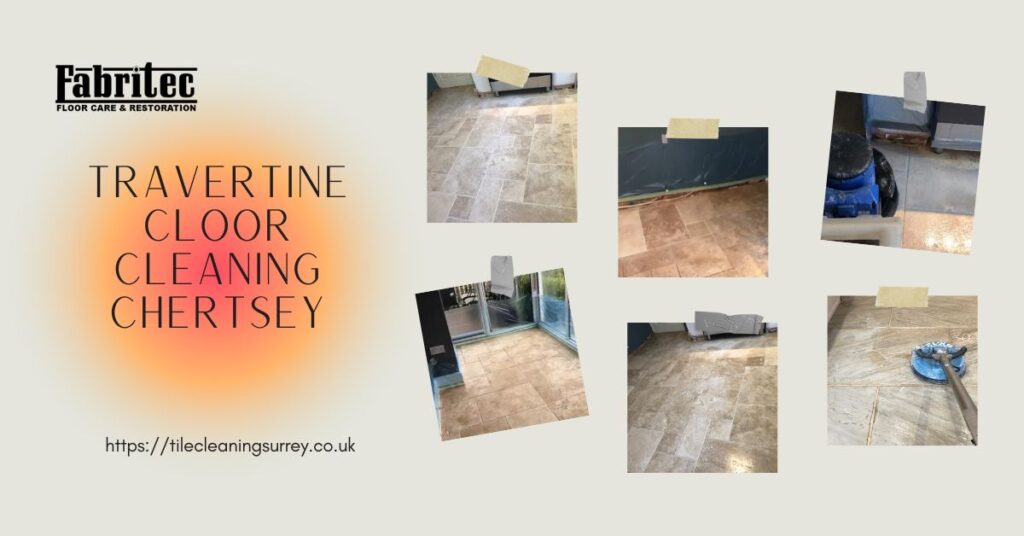
Unlock the Secrets to Exceptional Care for Your Beautiful Travertine Floors
Travertine floors are celebrated for their captivating natural beauty and distinctive texture, which necessitates careful and specialized maintenance to keep them looking their best. In a recent restoration project, we tackled the challenge of rejuvenating a heavily worn travertine floor in a residential property located in Chertsey, Surrey. This case study will delve into the detailed techniques we utilized to meticulously clean, repair, and seal the travertine flooring. Our thorough approach not only restored the floor to its original splendor but also enhanced its durability, ensuring it can withstand future wear and damage. Regular travertine floor maintenance is critical, as neglect over time can lead to significant deterioration and loss of beauty.
Conducting a Thorough Assessment and Preparing the Area for Effective Cleaning
During our initial evaluation, we observed clear signs of wear on the travertine floor, including substantial dirt accumulation within the grout lines, the presence of natural small holes typical to travertine, and minor cracks in several tiles. To create an efficient cleaning environment, we carefully moved all furniture from the area and performed an extensive vacuuming to eliminate loose debris and dust. This preparatory phase is crucial for the overall success of the cleaning operation. Additionally, we placed protective sheeting around nearby surfaces, such as kitchen units and adjacent flooring, to avoid any potential damage from cleaning agents or equipment. Implementing effective floor preparation techniques can significantly impact the ultimate results of the restoration process, ensuring a clean and safe working space.
Executing a Comprehensive Deep Cleaning Plan for Travertine Tiles
The foundation of revitalizing travertine lies in a well-planned deep cleaning regimen. We began the process by applying a diluted, professional-grade travertine cleaner across the entire floor area, giving special focus to the grout lines and heavily soiled spots. Allowing the cleaner to penetrate for approximately ten minutes effectively loosens embedded dirt and grime. We followed this by utilizing a rotary scrubbing machine to thoroughly agitate the cleaner into the tiles, which efficiently lifts the accumulated dirt and results in a significantly cleaner surface. To wrap up the cleaning process, we conducted a pressure rinse, a vital step that removes any remaining cleaning slurry and debris. This rinse also eliminates traces of previous sealers, ensuring the surface is fully prepared for the essential repair and sealing stages. The significance of deep cleaning travertine cannot be overstated, as it establishes the groundwork for a successful restoration and long-term maintenance.
Utilizing Expert Repair Techniques to Restore Travertine Integrity
Following the cleaning process, we identified several natural holes and minor cracks within the travertine tiles, common challenges associated with this type of stone. To effectively address these issues, we employed two specific repair strategies:
Seamless Repair of Natural Holes to Enhance Visual Appeal:
We utilized high-quality beige fillers that perfectly matched the existing tile color to fill in the natural holes. This important step not only restored the floor’s uniform appearance but also minimized the potential for future dirt accumulation in these crevices, thereby enhancing the overall visual appeal. A well-executed filling process is essential for preserving the integrity of travertine tiles and extending their longevity, ensuring they remain a beautiful feature of the home.
Expert Crack Repair Techniques for Long-Lasting Results
For the cracked tiles, we chose a durable resin grout that accommodates slight movement without risking further cracking. By meticulously color-matching the grout to the tiles, we ensured that the repairs were nearly seamless, preserving the overall aesthetic of the floor. These expert repair techniques are indispensable for maintaining the beauty and functionality of travertine surfaces, ensuring they remain attractive and resilient over time.
Applying a Premium Sealant to Protect and Enhance Travertine Floors
The sealing of the travertine floor is the final and most critical step in the restoration process. The application of a high-quality sealant is essential for protecting the stone from stains, spills, and everyday wear and tear, significantly extending the lifespan of the floor. For this particular project, we selected a high-solids, breathable sealer that penetrates the travertine while forming a robust protective barrier on the surface. Our client opted for a satin finish, which beautifully highlights the natural elegance of the travertine without producing an overly glossy appearance. After applying the sealer, we allowed it to cure for several hours, ensuring the floor was fully ready for regular use. The importance of sealing travertine floors cannot be overstated, as it plays a fundamental role in maintaining both the beauty and integrity of the surface over time.
Developing a Thorough Aftercare Strategy for Lasting Beauty
To ensure that the travertine floor maintains its refreshed and vibrant appearance, we provided our client with a comprehensive aftercare routine to implement regularly. This routine includes several essential practices:
- Utilize a pH-neutral cleaner specifically designed for sealed natural stone, such as LTP Floorshine, to prevent any damage to the protective seal.
- Regularly vacuum or dust the floor to remove dirt and debris that could potentially scratch the surface.
- Promptly clean up any spills to prevent staining, thus preserving the floor’s pristine condition.
- Reapply the sealer every 2 to 3 years, depending on foot traffic levels, to ensure the floor remains protected and retains its aesthetic charm.
Maintaining a consistent aftercare routine is vital for ensuring the longevity and beauty of travertine flooring, allowing homeowners to enjoy their beautiful floors for many years to come.
Transformative Results: The Advantages of Professional Restoration Services
Upon completing the cleaning, repair, and sealing processes, the travertine floor at the Chertsey property underwent an astounding transformation. The floor now boasts a renewed luster, with clean grout lines and nearly invisible repaired cracks. The client expressed immense satisfaction with the results, and the floor is now well-protected against potential future damage, ensuring its beauty lasts for many years ahead. This project highlights the effectiveness of professional maintenance in preserving both the aesthetic allure and functional longevity of travertine flooring. A delighted client remarked, “We couldn’t be happier with the results! Our travertine floor looks absolutely stunning—like it’s brand new again. The team was professional, thorough, and took great care to restore every detail. We’re thrilled with how well the repairs blend in, and the sealing has made cleaning so much easier. Highly recommend their service!”
Your Common Queries About Travertine Floor Care Addressed
How Often Should I Clean My Travertine Tiles?
Effectively maintaining travertine tiles requires consistent cleaning, ideally once or twice per week, depending on the level of foot traffic in your home. Additionally, undertaking a thorough deep cleaning every six months is advisable to ensure the tiles maintain their aesthetic appeal and longevity. Always select appropriate cleaning products to safeguard your investment in flooring. The frequency of travertine tile cleaning plays a crucial role in preserving its enduring beauty and structural integrity.
Can I Use Vinegar to Clean Travertine Surfaces?
Using vinegar on travertine surfaces is highly discouraged due to its acidic properties, which can damage the stone and its protective seal. Instead, it is far more beneficial to use a pH-balanced cleaner specifically formulated for natural stone, which will help maintain the integrity and longevity of your travertine flooring. Understanding the products to avoid is essential for travertine surface preservation and ensuring that floors remain in excellent condition.
What Are Common Signs of Travertine Damage?
Common signs of travertine damage include visible cracks, chips, discoloration, and uneven surfaces. Persistent stains or a dull appearance are also indicators of wear that require immediate attention to maintain both the aesthetics and structural integrity of the flooring. Recognizing these signs early can facilitate timely intervention, ensuring the durability of travertine floors and preserving their beauty for years to come.
Is Travertine Suitable for Outdoor Use?
Yes, travertine is highly suitable for outdoor applications due to its durability and inherent slip resistance. However, proper sealing is essential to protect it from environmental elements and staining, ensuring its longevity while maintaining its visual appeal in outdoor environments. Understanding the suitability of travertine for outdoor environments can assist homeowners in making informed choices for their outdoor spaces and enhancing their property’s value.
How Can I Prevent Future Staining on Travertine?
To effectively prevent future staining on travertine, it is essential to apply a high-quality sealer regularly, promptly clean up spills, and utilize pH-neutral cleaners. Additionally, maintaining a consistent cleaning routine will enhance the stone’s durability and visual appeal. Proactive measures are key to ensuring the long-term beauty of travertine surfaces and protecting your investment in flooring.
The post: Travertine Cleaning Chertsey was produced by Travertine Floor Cleaning Chertsey
The Article Cleaning and Sealing a Travertine Floor in Chertsey, Surrey appeared first on https://fabritec.org
The Article Travertine Floor Cleaning and Sealing in Chertsey Was Found On https://limitsofstrategy.com


Your post highlights a critical aspect of home maintenance that is often overlooked—specifically, how crucial specialized care is for natural stone surfaces like travertine. It’s fascinating to consider how the inherent qualities of travertine, from its porous texture to its unique aesthetic, require tailored maintenance strategies to sustain its beauty and functionality over time.
You’ve pointed out something really important about travertine that many people might not consider. Its porous texture does make it unique, but it also means it can absorb stains or moisture if not properly cared for. Regular sealing can help create a protective barrier, which is especially important for high-traffic areas or spaces that might see spills, like kitchens and bathrooms.
You’ve highlighted a key aspect of travertine that often flies under the radar. Its porous nature does give it an allure, but you’re so right about the importance of proper care. I’ve learned through experience that regular sealing really makes a difference, especially in areas that are prone to spills—like my kitchen, where it feels like something is always dripping or dropping. It can be a real challenge to keep those surfaces looking pristine.
You make an excellent point about the importance of specialized care for travertine. The porous texture is so fascinating, isn’t it? It’s almost like working with a living material—every little characteristic tells a story, but it definitely requires a different approach compared to more resilient surfaces.
I recently came across an insightful piece that delves into the specialized care needed for travertine floors in Chessington, which really complements the conversation on maintaining the unique beauty of these surfaces.
‘Reviving Travertine Floors in Chessington, Surrey’
https://yobiboy.com/reviving-travertine-floors-in-chessington-surrey/.
You bring up a really important point about the specialized care needed for natural stone surfaces like travertine. It’s true that many people don’t realize how pivotal that tailored maintenance is. The porous nature of travertine really does set it apart, and it can absorb stains and spills quite easily if not handled properly. I’ve seen instances where a simple sealing can make such a significant difference in preserving its integrity and beauty over time.
You’ve touched on something really important about travertine. Its unique qualities do require us to think differently about how we care for it. The porous texture, which gives it that stunning visual appeal, also means it can be more susceptible to stains or wear if not maintained properly.
Your insights on travertine floor maintenance really struck a chord with me, especially your emphasis on the importance of specialized care. I’ve always admired the elegance of travertine; its natural patterns add so much character to a space. However, I recently faced a dilemma when I moved into a home with dated travertine floors that showed signs of wear. Your restoration techniques seem like they might be the answer to breathe new life into what feels like a lost cause.
It’s wonderful to hear how the elegance of travertine resonates with you. Those natural patterns do have a way of bringing warmth and character to a home, don’t they? When it comes to dated travertine floors, the journey can feel daunting, but there’s a real opportunity for transformation.
I get it—dated travertine can feel like it’s wearing a turtleneck and sipping chamomile tea while the rest of the world is rocking the latest trends. But don’t throw in the towel just yet! Those natural patterns have stories to tell, even if they’ve aged like a fine cheese left out in the sun.
Your exploration of travertine floor restoration in Chertsey is quite informative and highlights the importance of meticulous care for such beautiful materials. The notion of conducting a thorough assessment before cleaning resonates with me, as I’ve noticed that many homeowners overlook this crucial step, which can lead to ineffective cleaning methods or, worse, damage.
You make an excellent point about the assessment process before diving into any cleaning method. It’s so easy to overlook the specifics of the material we’re dealing with, especially with something as distinct as travertine. The natural variations in stone can call for very different approaches, and a blanket cleaning method can sometimes do more harm than good.
You really captured the nuances of cleaning specialized materials like travertine. It’s fascinating how each type of stone not only has its aesthetic charm but also its own set of maintenance challenges. When I first started looking into natural stone care, I was surprised by how much misinformation is out there. For instance, even mild acidic cleaners can wreak havoc on travertine due to its calcium content.
That’s a great observation, and if you’re looking for guidance tailored to travertine, I found an article that really nails the specifics of cleaning and sealing this unique stone, which could be super helpful.
‘Cleaning and Sealing a Travertine Floor in Chertsey, Surrey’
https://yobiboy.com/cleaning-and-sealing-a-travertine-floor-in-chertsey-surrey/.
It’s true—when you dive into the world of natural stone care, it’s surprising how complex it can get. Each type of stone does have its unique characteristics that require a tailored approach. I’ve found that many people don’t realize how delicate a stone like travertine can be, especially since it often gets lumped together with other natural stones. The fact about acidic cleaners is a perfect example; it’s easy to assume that something mild won’t cause damage, yet that’s just not the case here.
You’re spot on about the importance of tailoring the cleaning method to the specific material, especially with travertine. It reminds me of how we often apply one-size-fits-all solutions in so many aspects of life, from cleaning to even personal care. Just as travertine has those unique variations that require a tailored approach, I think our individual needs across health and wellness do too.
You’ve brought up such a crucial aspect of cleaning natural stones like travertine. The unique characteristics of these materials can really dictate the best care practices. It’s fascinating how something as beautiful as travertine can have so many different textures and finishes, each requiring its own attention.
You’ve hit on a key point there. It’s fascinating how much attention to detail can make or break the restoration process for travertine. I think a lot of folks assume that all stone surfaces are basically the same and can be treated as such, so they jump right into the cleaning without really assessing what they’re dealing with. It’s easy to be lured in by quick fixes or flashy products that promise the world but end up being either too harsh or not effective at all.
You’ve raised such an interesting point about the nuances in stone restoration, especially with something as unique as travertine. It really does seem that many people underestimate the complexity involved. Each type of stone has its own characteristics and vulnerabilities, and it’s essential to start with a clear understanding of what you’re working with.
Restoring travertine floors truly requires a blend of artistry and technical know-how, and your recent project is a perfect example of that balance. It’s fascinating to see how understanding the specific characteristics of natural stone can lead to such effective maintenance and rejuvenation. I’ve always found that the unique patterns and textures of travertine give character to a space, but you’ve highlighted an essential point about the importance of diligent care to maintain that beauty.